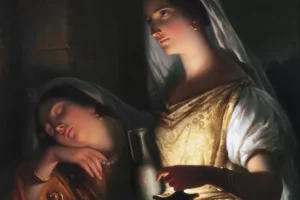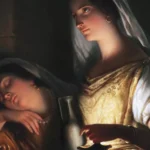God has established Covenants as vehicles for the fulfillment of His kingdom. Few Christians, let alone non-believers, understand or even know of these arrangements. However, these agreements shed light on an understanding of history and the world order and give a glimpse into finding clarity and insight into God’s ultimate plan for humanity.
God’s Covenants
A covenant is a formal agreement, or treaty, between two parties with specific obligations and constraints. Five of God’s covenants, the “everlasting covenants,” are absolute and non-nullifiable. One, the Mosaic Covenant, was temporary and explains many of the misconceptions concerning the Old Testament and Christianity.
The Noahic Covenant
In Genesis 6:18, God promises Noah, “I will establish My covenant with you….” This agreement included the following:
1) God pledges to the stability of nature; Genesis 8:22, “While the earth remains, seedtime and harvest, And cold and heat, And summer and winter, And day and night Shall not cease.”
Interestingly, the very first covenant provision of the very first covenant addresses the current worldwide concern over global warming. Man has zero ability to destroy or restore the earth, but God does.
Notice the term “while the earth remains,” it is clear that God’s wrath during the Tribulation will terminate the concept of “while,” and it is God, not men or global warming, that will destroy and recreate the earth.
Ironically, this very stability is also mocked as 2 Peter 3:3-4 claims, “…in the last day’s scoffers will come…They will say, ‘Where is this “coming” he promised? Ever since our ancestors died, everything goes on as it has since the beginning of creation.” Playing both sides of the argument is apparently nothing new.
2) Just like Genesis 1:28, God commands Noah in Genesis 9:1 to “..Be fruitful and multiply…” and in Genesis 9:7, “…Populate the earth abundantly and multiply in it.”
Again, God commands the exact opposite of common world beliefs on curbing population increase. Anxiety about population expansion is due to sinful disbelief in God’s capacity to provide for humanity.
3) In Genesis 9:2, God causes creation to fear man; “The fear of you and the terror of you will be on every animal of the earth and on every bird of the sky; on everything that crawls on the ground, and on all the fish of the sea.”
This is a change from the Garden of Eden and will return in the Millennium as illustrated in Isaiah 11:6-9, “And the wolf will dwell with the lamb, And the leopard will lie down with the young goat, And a little boy will lead them….”
4) In Genesis 9:3, animals become food, “Every moving thing that is alive shall be food for you; I give all to you, as I gave the green plant.” No longer, vegetarians, both man and animals, began eating meat, of course, with the attendant killing of animals and fish.
This also changes in the Millennium, as Isaiah 11:7 illustrates, “…the lion shall eat straw like the ox.”
5) Recognizing man as His image bearer, God institutes capital punishment, and Genesis 9:6 states, “Whoever sheds man’s blood, By man his blood shall be shed, For in the image of God He made man.”
Over 70% of the world’s countries and 37 of the 50 states prohibit capital punishment, in opposition to Genesis 9:6. God, however, will ultimately exact His perfect judgment.
6) Finally, in Genesis 9:15, God promises to never again destroy the earth by water; “Whenever the rainbow appears in the clouds, I will see it and remember the everlasting covenant between God and all living creatures of every kind on the earth.”
It is interesting to note who has absconded with the rainbow as the sign of their particular movement.
It is also notable to understand that God will eventually destroy the earth by fire; 2 Peter 3:7, “By the same word the present heavens and earth are reserved for fire, being kept for the day of judgment and destruction of the ungodly.”
If you recognize Satan’s persistent efforts to usurp God, the activities and events of this world become more understandable. As discussed in Ephesians 6:11-12, “…our struggle is not against flesh and blood, but against the rulers, against the authorities, against the powers of this dark world and against the spiritual forces of evil in the heavenly realms.”
Every one of God’s covenants has been and continues to be a target of Satan’s destructive efforts.
The Abrahamic Covenant
As a result of Adam’s sin, which passes to all of mankind according to Romans 5:12, “Therefore, just as sin entered the world through one man, and death through sin, and in this way death came to all people, because all sinned,” God establishes the Abrahamic Covenant as His plan to save both the Jews and the Gentiles and restore all things through a promise of many descendants and nations that would come through Abraham.
1) In Genesis 12:2, God promises Abraham, “I will make you a great nation….”
As a sovereign God, Abraham and the Jews were chosen to be used by God just as are all believers chosen.
2) He continues in Genesis 12:2, “I will bless you and make your name great.”
Throughout history, nations have come and gone, but Israel, despite persistent persecution, remains.
3) In Genesis 12:2, “You will be a blessing” for others.
This blessing is through the ultimate heir of Abraham, Jesus Christ, as confirmed in Matthew 1:1, where He is called “…the son of Abraham.”
4) In Genesis 12:3, God warns, “I will bless those who bless you, and him that dishonors you I will curse…”
It is fascinating to recognize the persecution of the Jews now and throughout history and to know that God will recompense them. All who have persecuted the Jews will face a divine judgment.
5) In Genesis 12:3, God finally reiterates, “In you all the families of the earth shall be blessed.”
This is confirmed in Galatians 3:7-9 where Paul promises, “Therefore, be sure that it is those who are of faith who are sons of Abraham. The Scripture, foreseeing that God would justify the Gentiles by faith, preached the gospel beforehand to Abraham, saying, ‘All the nations will be blessed in you.’ So then those who are of faith are blessed with Abraham, the believer.”
The Davidic Covenant
The heart of the Davidic Covenant is detailed in 2 Samuel 7:12-16 “…I will raise up your descendant after you, who will come forth from you, and I will establish his kingdom. He shall build a house for My name, and I will establish the throne of his kingdom forever. I will be a father to him and he will be a son to Me; when he commits iniquity, I will correct him with the rod of men and the strokes of the sons of men, but My lovingkindness shall not depart from him, as I took it away from Saul, whom I removed from before you. Your house and your kingdom shall endure before Me forever; your throne shall be established forever.”
The Davidic Covenant closely parallels the Abrahamic Covenant, and both are referred to at the beginning of the Gospels in Matthew 1:1, which heralds “The record of the genealogy of Jesus the Messiah, the son of David, the son of Abraham.”
The distinction between the Abrahamic and Davidic Covenants is that many descendants would come from Abraham, and through that, a savior from the kingly line of David would rule Israel (2 Samuel 7:12-16 above) and ultimately the earth Zechariah 14:9, “And the Lord will be king over all the earth; in that day the Lord will be the only one, and His name the only one.”
Several provisions are expanded in 2 Samuel 7, including:
Verse 12 promises to “establish a kingdom” and that “a coming son will establish this kingdom.”
Verse 16, in which “the throne of David will be established forever,” and,
Verse 19, in which the covenant states it is “instruction for mankind.” This reaffirms the Abrahamic covenant that God’s blessings will include Jews and Gentiles.
The New Covenant
Jeremiah 31:31-34 (to which Hebrews 8:8-12 quotes) is the foundational verse that enables and empowers God’s people to serve and remain in the blessing of the redeeming king promised in the Abrahamic and Davidic covenants. If the previous covenants are to provide a redeemer, the New Covenant is preparing the other half of the equation, God’s people, to receive their savior, and reads as follows:
“Behold, days are coming,” declares the Lord, “when I will make a new covenant with the house of Israel and with the house of Judah, not like the covenant which I made with their fathers [Mosaic Covenant] on the day I took them by the hand to bring them out of the land of Egypt, My covenant which they broke, although I was a husband to them,” declares the Lord.
“But this is the covenant which I will make with the house of Israel after those days,” declares the Lord: “I will put My Law within them and write it on their heart; and I will be their God, and they shall be My people. And they will not teach again, each one his neighbor and each one his brother, saying, ‘Know the Lord,’ for they will all know Me, from the least of them to the greatest of them,” declares the Lord, “for I will forgive their wrongdoing, and their sin I will no longer remember.”
This New Covenant was made with Israel but extends to the Gentiles and includes the indwelling of the Holy Spirit, which was not previously universally available, a new heart, and the forgiveness of sin.
This is confirmed in Ezekiel 36:26-27: “Moreover, I will give you a new heart and put a new spirit within you; and I will remove the heart of stone from your flesh and give you a heart of flesh. I will put My Spirit within you and cause you to walk in My statutes, and you will be careful to observe My ordinances.”
In Luke 22:20, Christ explicitly links this New Covenant to His substitutionary death on the cross: “And in the same way He took the cup after they had eaten, saying, ‘This cup which is poured out for you is the new covenant in My blood,’” and His identification as the suffering servant of the Lord in Isaiah 53:3-6 where He was “pierced through for our transgressions.”
It is this New Covenant that is in effect during the Church Age, the Mosaic Covenant having been broken by the house of Israel.
The Priestly Covenant
Unique in all the covenants is the Priestly Covenant of Numbers 25:10-13,
“Then the Lord spoke to Moses, saying, ‘Phinehas the son of Eleazar, the son of Aaron the priest, has turned away My wrath from the sons of Israel in that he was jealous with My jealousy among them, so that I did not destroy the sons of Israel in My jealousy. Therefore say, “Behold, I give him My covenant of peace; and it shall be for him and his descendants after him, a covenant of a perpetual priesthood, because he was jealous for his God and made atonement for the sons of Israel.” ‘”
This covenant reveals that during the Millennium kingdom, priestly obligations will exclusively be fulfilled by the decedents of Phinehas because of his faithfulness.
We may not fully understand this, but we trust what Isaiah 55:8-9 claims “For My thoughts are not your thoughts, Nor are your ways My ways,” declares the Lord. “For as the heavens are higher than the earth, So are My ways higher than your ways And My thoughts than your thoughts.”
The Mosaic Covenant
Because of the story of Moses and the Ten Commandments, the most well-known covenant is the solitary temporary agreement. The Mosaic Covenant is The Law that God gave Israel through Moses to govern his people in the Promised Land of Canaan (Exodus 19:5-6) after the exodus from Egypt. It consisted of 613 commandments, of which the Ten Commandments were a summary.
It was never to be a means to salvation, as Romans 3:20 explains, “Because by the works of the Law no flesh will be justified in His sight; for through the Law comes the knowledge of sin,” but it was a way for Israel to show its love and commitment to God and for God to care for His people.
Although Romans 7:12 state the Law was “holy, and righteous, and good,” it morphed, under Pharisaic rule, into legalistic hindrances and self-righteousness, as Paul shows in Romans 9:30-32 “What shall we say then? That Gentiles, who did not pursue righteousness, attained righteousness, even the righteousness which is by faith; but Israel, pursuing a law of righteousness, did not arrive at that law. Why? Because they did not pursue it by faith, but as though it were by works. They stumbled over the stumbling stone.”
Romans 7:6 clearly states that Christians, and thus the Church, are not under the Law of Moses: “But now we have been released from the Law, having died to that by which we were bound, so that we serve in newness of the Spirit and not in oldness of the letter.” Additionally, Galatians 5:18 confirms this when it states: “But if you are led by the Spirit, you are not under the Law.”
This should clear up the many questions about “keeping the Sabbath holy” vs. Sunday, the strict rules and punishments in the Old Testament, and various other ceremonies and practices that were all part of the Mosaic Covenant.
Effectively, however, nine of the ten commandments (all but keeping the Sabbath holy) are used in various parts of the New Testament. In Romans 15:4, Paul explains their continued importance when he states: “For whatever was written in earlier times was written for our instruction so that through perseverance and the encouragement of the Scriptures we might have hope.”
In fact, in Matthew 22:37-40, Jesus answers a question about what are the greatest commandments in the law; “And He said to him, ‘You shall love the Lord your God with all your heart, and with all your soul, and with all your mind.’ This is the great and foremost commandment. The second is like it, ‘You shall love your neighbor as yourself.’ On these two commandments depend the whole Law and the Prophets.” Indeed, no one is released from these two laws.
Summary
It helps to understand the Bible in terms of God’s persisting effort to construct a relationship with humanity; as the Westminster Shorter Catechism explains, “…the chief end of man [is] to glorify God, and to enjoy him forever.”
The sin of Adam shattered God’s prototype attempt at this perfect relationship in the Garden of Eden. At Christ’s first coming, His chosen people, the House of Israel, again rejected His efforts to establish a kingdom. However, He will come again, this time without fail, to establish His kingdom in the Millennium and then forever in the New Heaven and New Earth.
The Covenants lay the groundwork for this majestic accomplishment.
- The Noahic Covenant established our Earthly environment.
- The Abrahamic Covenant established the descendants, out of which a redeemer came.
- The Davidic Covenant established the kingly line, out of which a savior came.
- The New Covenant established the people who would receive the promised redemption.
- The Priestly Covenant is a special covenant, the full impact of which will be recognized in the Millennium.
- The Mosaic Covenant was The Law that temporarily showed God’s people how to honor and obey Him.
We will continue exploring how “God works out His Ultimate Plan” in future editions of this series.








